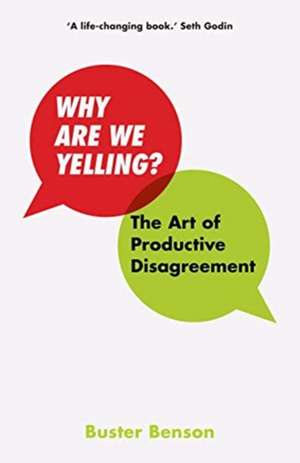Benson, B: Why Are We Yelling?
Autor Buster Bensonen Paperback – 18 noi 2019
The way we argue is broken. Whether it's about Brexit, the existence of ghosts, the best burger in the city or who's allowed to sit in your favourite chair, we end up digging our heels in and yelling at one another or choosing to avoid heated topics entirely. There has to be a better way.
Buster Benson, a Silicon Valley entrepreneur with two decades of experience facilitating hard conversations at some of the biggest tech companies in the world, recommends ten things to try in order to make disagreements more productive. By applying these ten new habits we can flip frustrating, unproductive disagreements into ones that bear fruit and bring people closer together.
In this book you'll master practical skills to make your disagreements more productive by:
- Understanding four ways of disagreeing that are more valuable than simply 'winning' the argument
- Identifying the kind of argument you're having so you know how best to approach it
- Articulating the best possible version of your opponent's argument before attacking it.
With this new toolkit we can explore more possibilities and perspectives in the world, simply because we'll no longer be afraid to wade into scary topics of conversation.
Preț: 65.74 lei
Preț vechi: 95.56 lei
-31% Nou
Puncte Express: 99
Preț estimativ în valută:
12.58€ • 13.09$ • 10.39£
12.58€ • 13.09$ • 10.39£
Carte disponibilă
Livrare economică 24 martie-07 aprilie
Preluare comenzi: 021 569.72.76
Specificații
ISBN-13: 9781529004946
ISBN-10: 1529004942
Dimensiuni: 152 x 233 x 25 mm
Greutate: 0.36 kg
Editura: Pan Macmillan
ISBN-10: 1529004942
Dimensiuni: 152 x 233 x 25 mm
Greutate: 0.36 kg
Editura: Pan Macmillan
Notă biografică
Buster Benson is an entrepreneur and a former product leader at Amazon, Twitter, Slack, and Patreon. He's now CEO of 750words.com and writes for Medium and busterbenson.com. This is his first book.
Descriere
A practical guide to having more honest and constructive arguments, featuring whimsical illustrations and real-world examples of arguments-gone-wrong
